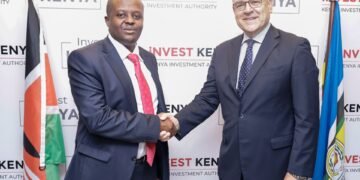As part of its commitment to a successful implementation of the African Continental Free Trade (AfCFTA) Agreement, Nigerian Government said, efforts are ongoing to establish a trade remedies authority to enforce Rules of origin and tighten borders against fraudulent invoicing.
The Minister of Industry, Trade and Investment, Otunba Adeniyi Adebayo, made the disclosure at Lagos State Government House while paying a call on Governor Babajide Sanwo-Olu as part of the Nationwide Sensitisation visit to Lagos by the National Action Committee on the AfCFTA.
The Minister added that the Federal Government was committed to establishing Nigeria’s designated competent authority for administering the AfCFTA rules of origin as well as automating the process for managing exporter and product registration.
Adebayo, said the National Action Committee on the AfCFTA, which he Chairs, is collaborating with the National Trade Facilitation Committee domiciled in the Federal Ministry of Industry, Trade and Investment to facilitate the execution of the regional trade facilitation roadmap.
The Minister highlighted the AfCFTA implementation plans to include domestication of the AfCFTA Agreement, border enforcement and Rules of origin enforcement, trade facilitation and ease of doing business, production and service capacity growth, power and trade logistics infrastructure, market access, skills and human capacity development , and quality infrastructure.
Responding, Governor Sanwo-Olu, announced the State Government’s willingness to domesticate the policies of the AfCFTA to accelerate the actualisation of the recently launched Lagos thirty-year Development Plan.
According to Governor Sanwo-Olu, Lagos State Government will explore all the opportunities inherent in the AfCFTA Agreement to grow its revenue and GDP base and create employment for youth.
Speaking at a press conference with the Journalists shortly after the meeting with the Governor, the Secretary of the National Action Committee, Francis Anatogu said: “Our strategy is to work with the states based on their areas of comparative advantages and Lagos State has been identified to have trade strength in ICT, telecommunication, transportation and financial services”.
He said the core objective of the AfCFTA is to create a single market for goods, services, and free movement of persons in order to deepen the economic integration of the African continent.
“The AfCFTA is expected to deliver an integrated continental market of 1.27 billion consumers with an aggregate GDP of USD3.4 trillion. Nigeria constitutes a significant portion of these figures largely spread across our states,” he said.
In his remarks, Commissioner for Economic Planning and Budget, Mr. Samuel Egube, the State Government has come to understand that the GDP impact of the AfCFTA Agreement on the State’s economy would be massive as result of free movement of people, goods and services.
He noted that already, many SMEs and big companies in Lagos have built international trust through partnerships and exports of goods and services to other parts of the world, adding that the AfCFTA Agreement is coming at no better time than now.
Expressing concern over the competitiveness of Nigerian MSMEs at the continental level, Commissioner for Commerce, Industry and Cooperatives, Mrs. Lola Akande, said Nigerian small businesses need financial capacity and training support to enable them produce products that meet international standards and good packaging required to attract diverse buyers.
Speaking, the Executive Secretary, African Shipowners Association, Funmi Folorunso, stressed the need for the Federal Government to focus energy on making Nigeria the transportation hub for Africa, adding that countries like Ghana have cut their trade niche under the AfCFTA.
Other key speakers at the press conference include Director of Trade, Federal Ministry of Industry, Trade and Investment, Aliyu Abubakar, Special Adviser to Lagos State Governor on SDG and Investment, Mrs. Solape Hammond and Director-General of NACCIMA, Ambassador Ayoola Olukanni.





























































